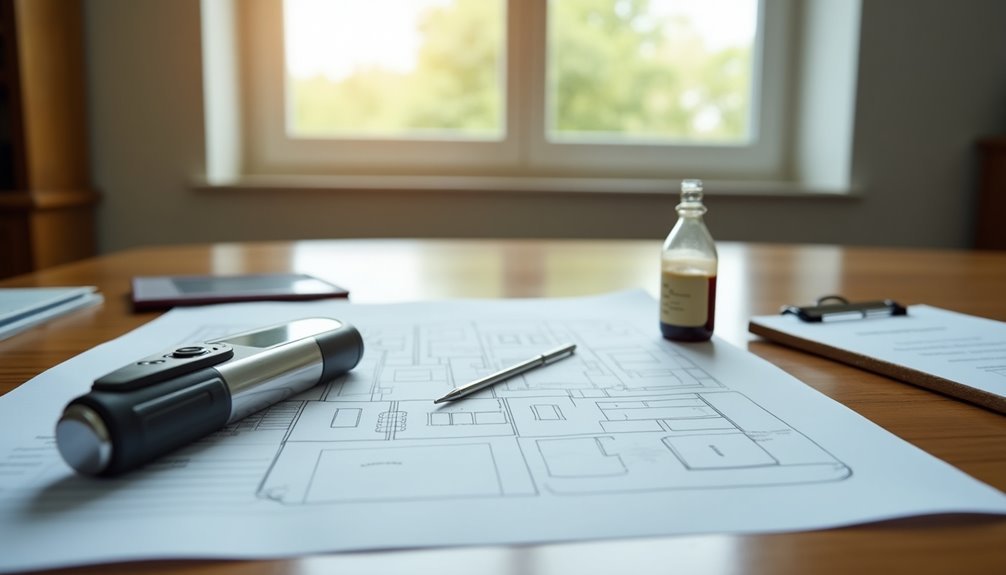To choose the right asbestos inspection service for your property, focus on the inspectors' qualifications. They should have completed accredited training and hold necessary certifications. Verify they have at least two years of documented experience in building surveys. Understand the types of surveys offered: Management, Refurbishment, and Demolition, and select one based on your property's needs. Ensure the service follows compliance regulations, including the Control of Asbestos Regulations 2012. Additionally, look for a comprehensive inspection and testing process that includes detailed reports and clear recommendations. There's much more to consider when making your choice.
Understanding Asbestos Inspection Services

Understanding asbestos inspection services is crucial for maintaining safety and regulatory compliance in any building. These services encompass various types of surveys, each tailored to identify and manage asbestos-containing materials (ACMs) effectively. Management surveys focus on assessing ACMs during normal occupancy, while refurbishment surveys are essential before renovation activities, ensuring all ACMs are identified. Demolition surveys, the most comprehensive, are mandatory prior to any demolition, requiring thorough testing to protect workers and the public.
By conducting these inspections, you not only adhere to federal, state, and local regulations—like the Control of Asbestos Regulations 2012—but also prioritize health safety. Regular reinspections help monitor the condition of ACMs, ensuring ongoing compliance and risk assessment. This proactive approach is vital for developing effective asbestos management plans that safeguard occupants and reduce legal liabilities. Additionally, the major risk arises during damage, demolition, or renovation of ACMs, highlighting the importance of timely inspections.
In choosing an asbestos inspection service, consider their capability in conducting sampling, laboratory analysis, and visual inspections. Their expertise in abatement oversight and air quality monitoring further supports a commitment to health safety. Ultimately, understanding these services empowers you to make informed decisions that promote a safer environment for everyone involved.
Key Qualifications of Inspectors
When selecting an asbestos inspection service, the qualifications of their inspectors play a pivotal role in ensuring thorough and reliable assessments. You should look for inspectors who have completed accredited training, typically a 24-hour course that covers essential topics like health effects of asbestos, identification of asbestos-containing materials, and sampling procedures. Ensure they maintain their certification by attending annual refresher courses. Additionally, it is important that inspectors are knowledgeable about asbestos regulations and compliance, as this understanding is essential to providing accurate assessments.
Experience is equally important; inspectors should have at least two years of documented work in building surveys and hazard assessments related to asbestos. Some states may allow relevant degrees or prior experience to fulfill these requirements. Technical competence is crucial, so verify that inspectors hold the P402 qualification, demonstrating their knowledge of asbestos surveying and risk awareness.
Finally, check for proper accreditation. In the U.S., certification from state or federal authorities adhering to asbestos regulations is mandatory. In the UK, look for UKAS accreditation to ISO/IEC 17020, which signifies technical competence. By focusing on these key inspector qualifications, you can ensure that you choose a service that provides reliable and compliant asbestos inspections for your property.
Importance of Training and Certification

Choosing a qualified asbestos inspection service hinges significantly on the training and certification that inspectors possess. Without the right credentials, you might be putting your health and property at risk. Understanding the training requirements and certification process is crucial in making an informed decision.
- Accredited Training: Inspectors must complete courses conducted by accredited agencies, covering essential topics like asbestos characteristics and health effects.
- Rigorous Certification: Certification isn't just a formality; it requires passing an exam with at least a 70% score and submitting various documents to state or federal authorities.
- Ongoing Education: Certifications need renewal through annual refresher courses, ensuring inspectors stay updated on safety standards and regulations.
When selecting an inspection service, prioritize those with verifiable training and certification. This not only ensures compliance with state and federal regulations but also guarantees the inspector's ability to perform accurate assessments. Your choice can significantly impact your safety and peace of mind, so don't overlook the importance of proper training and certification in the fight against asbestos exposure.
Types of Asbestos Surveys
As you navigate the process of selecting an asbestos inspection service, it's essential to grasp the various types of asbestos surveys available. Primarily, you'll encounter Management Asbestos Surveys, which are non-intrusive. These surveys locate and assess the presence of suspect asbestos-containing materials (ACMs) and ensure they're in good condition, as mandated by the Control of Asbestos Regulations 2012 for non-domestic properties. They include sampling materials for laboratory analysis and typically cover visible, accessible areas.
On the other hand, Asbestos Refurbishment and Demolition Surveys are more intrusive. They involve destructive sampling to identify ACMs in areas that will be disturbed during renovation or demolition. These surveys examine both interior and exterior materials and are crucial for compliance with asbestos regulations, ensuring safety during major works.
When selecting an appropriate survey, consider your objectives and the building's conditions. Understanding the distinct survey methodologies allows you to make informed decisions, ensuring the safety of occupants and compliance with legal obligations regarding ACM management. Selecting the right survey type is vital for effective asbestos management in your property.
The Inspection and Testing Process

Navigating the inspection and testing process for asbestos involves a systematic approach to ensure safety and compliance. To start, inspectors conduct an initial assessment that includes reviewing the property's history and interviewing owners to identify potential asbestos-containing materials (ACMs). This lays the groundwork for a thorough visual inspection and sampling.
Here's what you can expect during the process:
- Detailed Visual Inspection: Inspectors evaluate all accessible areas for suspect materials.
- Careful Sampling Techniques: Bulk samples are collected from identified "hot spots," ensuring minimal disturbance and using appropriate safety measures.
- Accredited Laboratory Analysis: Samples are sent to labs utilizing techniques like Polarized Light Microscopy (PLM) for precise results.
The laboratory analysis typically takes 3 to 10 days, revealing the presence, type, and percentage of asbestos. You'll receive a comprehensive report detailing the findings, which will include recommendations for managing any identified risks. By understanding this process, you empower yourself to take informed decisions about your property's safety, leading to liberation from health concerns associated with asbestos exposure.
Conclusion
When choosing an asbestos inspection service, remember that this decision can be as crucial as selecting a skilled navigator for an uncharted sea. Your health and safety depend on their expertise, so prioritize qualified, certified inspectors who understand the nuances of various asbestos surveys. By thoroughly vetting potential services, you ensure a thorough inspection process, safeguarding your property and loved ones from the hidden dangers of asbestos. Don't leave your safety to chance; choose wisely.
